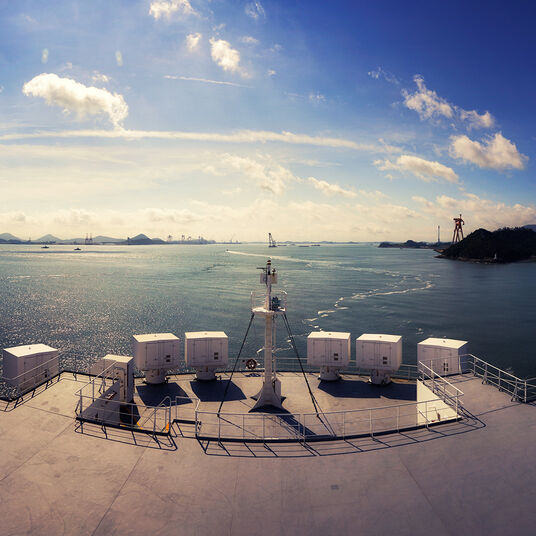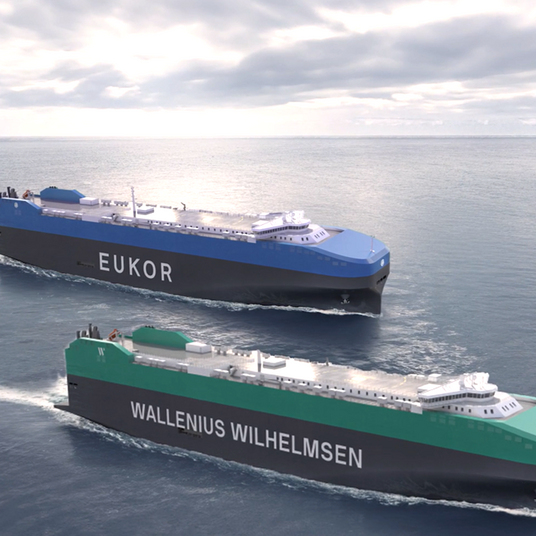Fueling a decarbonized future: the new energies taking us towards net-zero 2040
At EUKOR, we are continuing our journey towards net zero emissions together with partners and customers, with the majority of our new contracts now including our Reduced Carbon Service. Biofuel is being introduced across our fleet, it is a lower emission energy source, compared to traditional bunker fuels, which delivers verifiable emission reductions for customers.

Sourcing the right fuel
To be able to deliver on our customers’ targets, comply with developing regulations, and meet our own ambitious target to become net zero by 2040 we need to utilize alternative, low carbon fuel sources. The biofuel blends we are introducing into the fuel mix now are a reduced carbon energy source. They can be used as drop-in fuels, meaning they are compatible with current combustion engines and can be used on existing vessels without need for modification.
The biofuel blends we are using are produced from used cooking oil (UCOME[1]). We do not source biofuel derived from palm oil or palm oil derivatives. In the short term Wallenius Wilhelmsen will use biofuels on our existing vessels to offer our customers shipping services with a reduced carbon footprint. In 2024 we will replace more than 10% of our total fuel consumption with biofuel blends, the majority being a B30 blend, which is a blend of 30% biofuel and 70% conventional fuel. A B30 blend provides emission savings of ~25% compared to conventional fuels.
[1] Used Cooking Oil Methyl Ester
Finding the correct balance
The low carbon fuels we use to replace conventional fuel are only available in a few locations around the world. Given the global nature of our operations, servicing customers and trade routes around the world, we have developed our Reduced Carbon Service on a mass-balance principle within our network. This means we are bunkering biofuel on our vessels, typically in Europe or Asia, while we can offer all our customers around the world the benefits of a reduced carbon service due to the mass balance principle.
How do we do it?
"The emission savings we achieve by replacing conventional fuel with a biofuel blend is recorded in our internal Emission Bank using a methodology known as ‘insetting’. From here emission reductions compared to using conventional fuels are allocated to the cargo belonging to our customers purchasing the Reduced Carbon Service. The customers are issued a declaration, which is verified by an independent third party, announcing how much they have reduced their scope 3 emissions” says Jon Tarjei Kråkenes. Jon Tarjei is Head of the Orcelle Accelerator Taskforce at Wallenius Wilhelmsen. In 2023, we created the taskforce, with their role, as the name would suggest, to speed up the assessment, trialing and integration of new solutions which contribute to our decarbonization journey.
Planning in evolving market conditions
The introduction of biofuels into the fuel mix is the first step into the low-carbon fuel area for EUKOR. Step two will be to introduce green methanol when our Shaper Class vessels will be delivered in 2026-2027.
Our strategy is to only invest in new vessels that can operate on near zero carbon fuels and meet our net zero 2040 emission ambitions. The eight new Shaper Class vessels ordered between October 2023 and February 2024 are expected to be delivered in 2026-2027. These vessels are methanol capable and can operate either on conventional VLSFO, biofuel or green methanol.
Regulatory and industry developments helping to drive change
Our fuel strategy reflects the policies outlined by regulatory bodies as well as our and our customers’ demand to reduce greenhouse gas emissions (GHG). Both the International Maritime Organization (IMO) and European Union (EU) are introducing GHG reduction measures that will enforce the use of low carbon fuels. By collaborating with and supporting these organizations, we can contribute shaping the future of net zero deep-sea shipping.
The IMO’s carbon intensity regulation went into effect in 2023, and now the EU ETS – which is a mandatory cap-and-trade regulation on all vessels operating in EU ports – is coming into effect this year. Next year, the FuelEU Maritime regulation will introduce “well-to-wake” GHG emission requirements per unit of energy used by ships calling European ports, while the IMO is developing its own regulations in the same direction.
"The FuelEU Maritime regulation allows for compliance across a fleet pool, meaning that one ship in the group can over-achieve on the well-to-wake GHG intensity, promoting the use of near zero emission fuels by modern vessels. This can be of particular interest in light of the new Shaper Class vessels in the fleet,” says Christos Chryssakis, Head of New Energy.

